Open-source, decentralized crypto projects like Decred and Monero are not owned or controlled by any individuals. Instead, they are maintained and developed by community members who work together to improve the network.
Monero is one of the most well-known privacy-focused coins on the market. Just like Decred, it is an open-source crypto with ethos centered around the belief that financial privacy is a fundamental human right. Both projects believe that individuals should have the autonomy to control and secure their financial data. Let's compare those two cryptocurrencies with notable similarities and some significant differences.
A decentralized, open-source cryptocurrency that focuses on providing enhanced privacy for its users, this is how we can describe Monero (XMR). The coin's origins can be traced back to the CryptoNote protocol, described by Nicolas van Saberhagen on October 2013. CryptoNote objective was to provide maximum privacy and security for digital currency transactions, using several cryptographic techniques to conceal the identities of the sender and receiver in a transaction. We will be back to the privacy features later, but first, let`s describe how Monero functions.
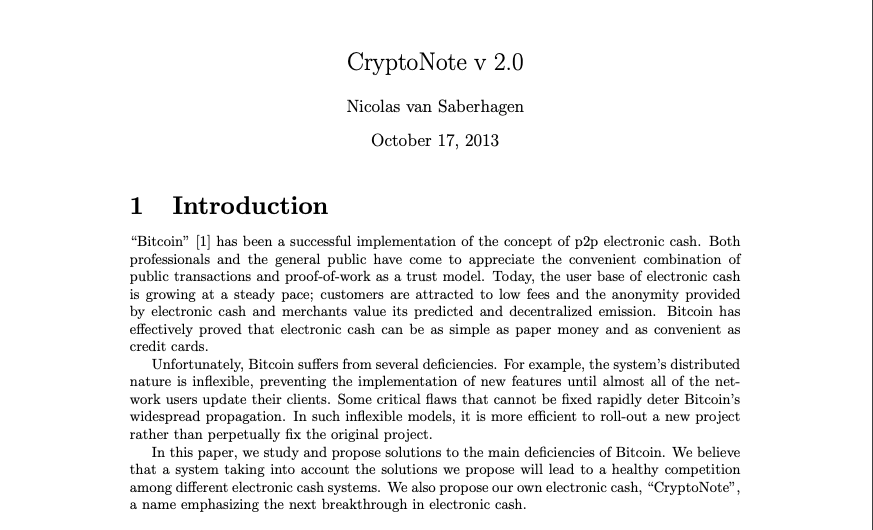
Operation
Transactions on the Monero network are processed and recorded on a public blockchain, maintained by a network of users who contribute computational power to validate transactions. The project uses randomx, an algorithm created by Monero community members, to make mining ASIC-resistant, meaning that it's difficult for large mining operations to dominate the network and compromise its security and decentralization.
Decred operates with a different protocol, using a hybrid consensus system, which combines elements of proof-of-work (PoW) and proof-of-stake (Pos). In this system, Pow miners create new blocks and validate transactions, as they do in Monero, but they only receive 10% of block rewards. 80% of the portion gets distributed between PoS voters, who are stakeholders that hold and stake DCR. This hybrid consensus system allows for a more democratic and decentralized decision-making process, as miners and stakeholders are essential to the project. PoW miners provide the computational power to secure the network, while PoS voters provide the governance power needed to make decisions about the future of Decred.
Regarding the coin supply Monero and Decred have meaningful differences. Decred has a limit stock of 21 million coins, following Bitcoin steps. DCR coins get mined every five minutes, the mining reward is reduced approximately every 21 days by 1%. By 2027 there will be 19 million DCR in circulation, the remaining 2 million DCR will become available in the next one hundred years. One of the project objectives is to address the creation of a low-inflation currency.
Monero has a finite supply of coins. The emission schedule was designed to decrease the number of new coins generated per block over time until a total of 18.4 million XMR are in circulation. It is worth mentioning that Monero has a feature called tail emission that allows for a small number of coins to be mined even after reaching the total supply.
Monero block rewards will never drop to zero. Block rewards gradually dropped until the tail emission commenced at the end of May 2022. At this point, rewards are now fixed at 0.6 XMR per block. (block reward per year = 157,680 XMR) https://www.getmonero.org/resources/moneropedia/tail-emission.html
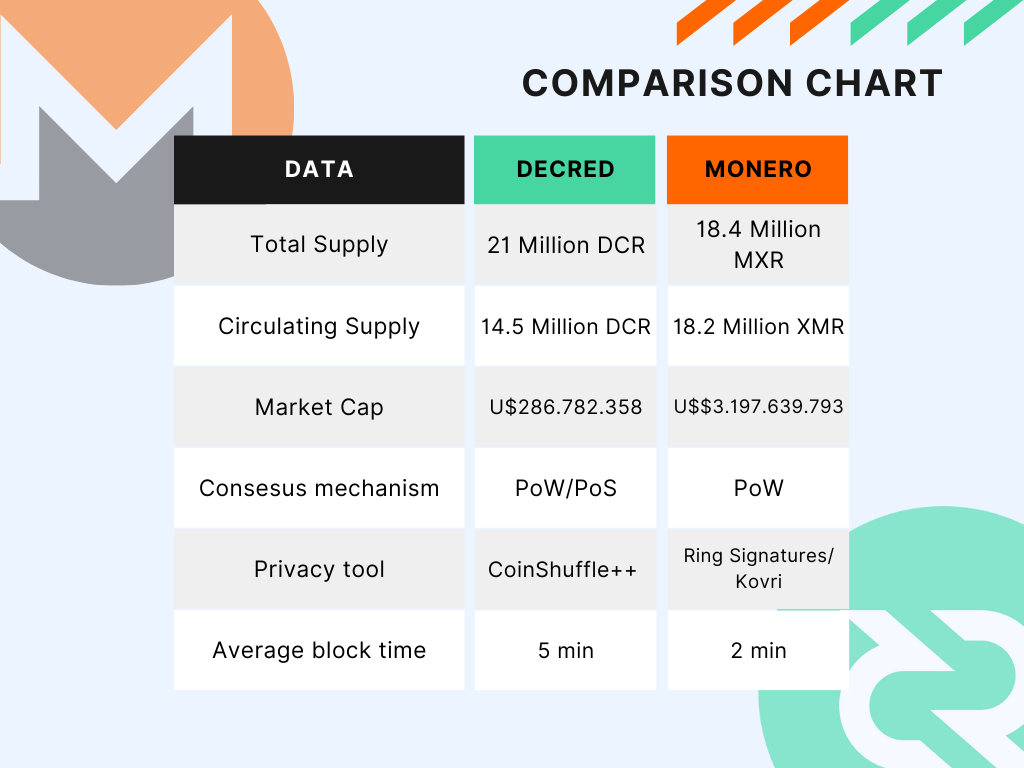
Funding
Open-source, decentralized crypto projects like Decred and Monero are not owned or controlled by any individuals. Instead, they are maintained and developed by community members who work together to improve the network. Monero does not have central funding, its development is funded from a variety of sources, including:
Donations
Monero relies on donations from individuals and organizations to support its development. These donations can be made in Monero or other cryptocurrencies and are usually directed toward specific development projects or initiatives.
Crowdfunding
Monero has used crowdfunding campaigns to raise funds for specific projects or initiatives, such as the development of Kovri, a routing protocol that helps to conceal the IP addresses of Monero users.
Decred has found the solution for its funding by directing 10% of all block rewards to the project's treasury. All funds get directed after debating and voting on the Politeia platform, where stakeholders decide on proposals for different areas, such as development and marketing.
Transactions and Privacy
The anonymity Monero offers stands out in the crypto market, one of its features is a technique called ring signatures, a type of digital signature used to conceal the identities of senders and receivers in transactions. Another privacy feature is stealth addresses, a one-time public address generated for each transaction. With that, the recipient's actual address does not get revealed in transactions. All Funds sent to the stealth address can only be accessed by the intended recipient. Those features make XMR a popular choice for individuals and organizations looking to maintain their financial privacy.
Those robust privacy features come with a cost. The use of ring signatures and stealth addresses can make transactions larger compared to other cryptocurrencies, bringing some problems concerning network scalability. Like Zcash, Monero's association with illicit activities has made some people hesitate to adopt it. Focusing on privacy has made Monero a target of regulatory scrutiny, it could face difficulty in some jurisdictions where regulators are cracking down on privacy-focused crypto.
Decred deploys CoinSuffle++ (CSPP) mixing protocol for anonymizing transactions. Output addresses are encrypted, making it impossible to match them with the inputs. In addition, it also masks the ownership of DCR coins. The project operates on several exchanges, including Binance. However, it warns that using these exchanges isn't entirely private.
Decred proposed and built its own exchange, DCRDEX, to increase anonymity and security while transacting. DCRDEX leaves users with full coin custody and free from arbitrary transaction fees.
Moving Foward
After this brief project comparison, we also have to mention the power of their respective communities. Both Decred and Monero have active communities, always ready to discuss the future and development directions. Those strong communities have proven that projects like Decred and Monero are not composed only of a blockchain and a bunch of software, but principally by the people involved. Do you agree? Leave a comment!


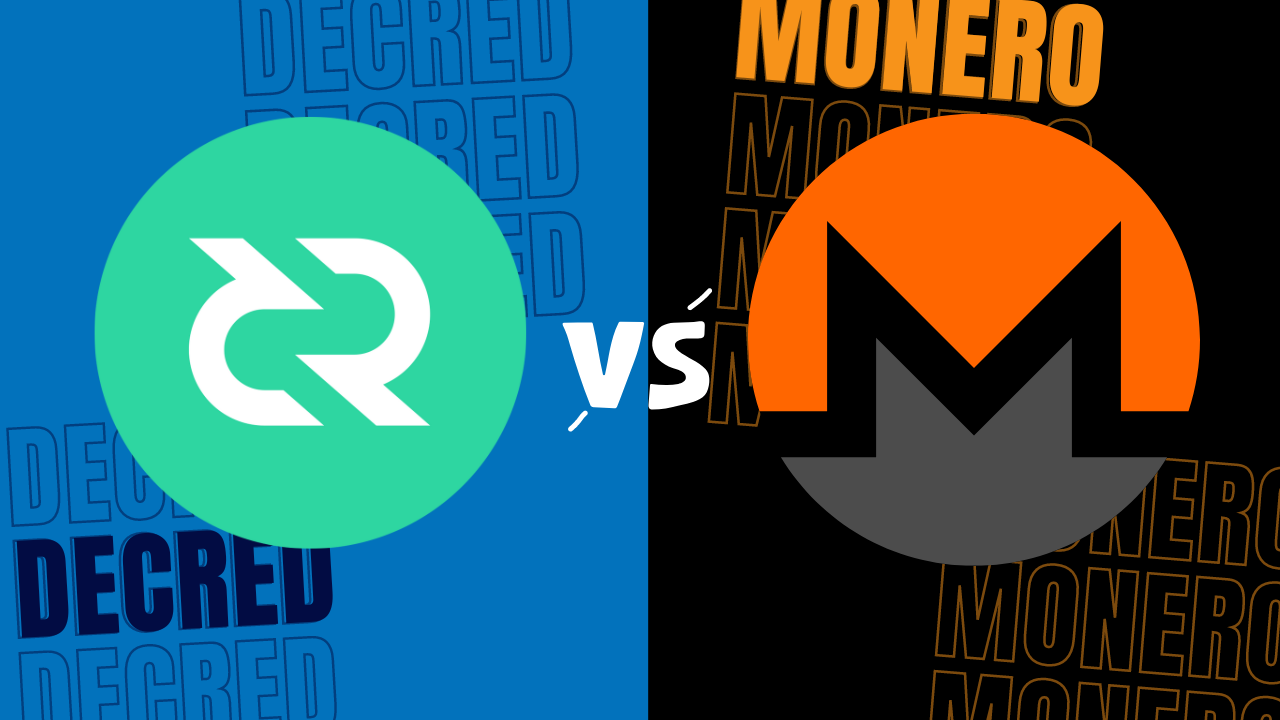
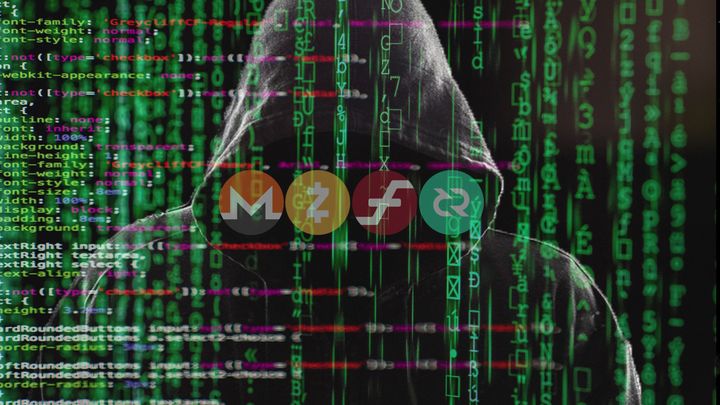
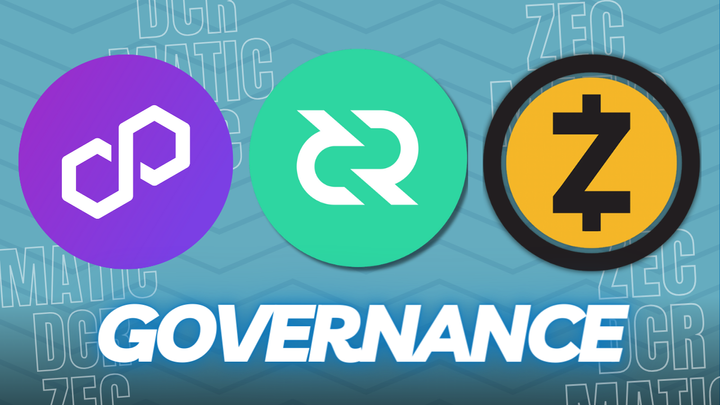

Comments ()